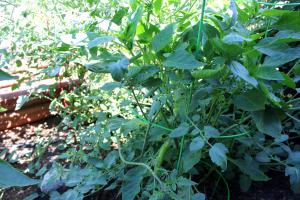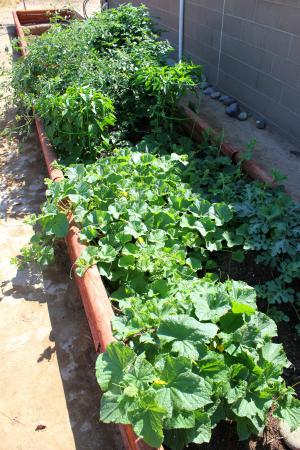Editor’s note: This is the third in a series of sustainability stories we’ll bring you over the summer. From our burrowing owl habitat and recycling efforts to our solar panels and garden, EMCC prides itself on its many sustainability practices. As Physics Professor Dr. Dwain Desbien said at the 23rd Annual Commencement Ceremony, “The best goal you can have in life is to leave the world a little better place for you having been in it.”
Estrella Mountain Community College, how does your garden grow? If 33 Hefty bags full of leafy greens is any indication, quite well actually. That’s how many bags of spinach, kale, and chard came out of the garden’s first harvest this past winter.
The Community Teaching Garden, which is just northwest of the Fire Science Storage Facility, was installed last July. Student Veterans Club members provided much of the initial elbow grease, digging down about 20 inches and removing the hard caliche from four 16- by 4-foot beds. Mulch was then laid down for drainage, and two truckloads of donated compost filled the first bed. Winter greens were planted in October and harvested in late January and early February. By March, the spring garden had been planted.
The first bed is currently overflowing with tomatoes, peppers, cucumbers, zucchini, and watermelon, and with more donated compost, the remaining three beds are being prepped.
“Our tomatoes look amazing right now,” Life Sciences Professor Dr. Jarod Raithel said in early May.
A mix of user groups — Raithel’s research assistants, interns, and honors students, Environmental Biology students (BIO 105), and the Horticultural Innovations Club — tend the garden, which is teaching them so much more than the number of days till germination and harvest. Or what to plant in the spring vs. what to plant in the fall. Or how much water is necessary to keep the plants alive, thriving, and fruiting. This garden is teaching them about sustainability from start to finish. In addition to the donated compost, Raithel is teaching his students how to make their own while keeping valuable resources out of our landfills.
“Composting is not rocket science,” Raithel said. “It’s like anything else, trial and error. If it’s too dry, add water, if it smells like eggs, add leaves. You just kind of get a feel for it. And it feels so good to not be throwing all that green waste into a landfill.”
They’ve already been collecting coffee grounds from the Eco Cafe and Raithel hopes to start collecting green waste from Regions and the Lion’s Den Grill this fall. But the recycling efforts don’t stop there. Old exams go into the composter too, but not before they’re shredded and first used as bedding in the rodent cages in the Life Sciences lab.
But one can never really have enough compost, so some honors students built a receptacle and informational sign in the maker space that will soon be placed behind the garden for faculty, staff, students, and community members to drop off green waste.
“It will be for people who don’t want to maintain a composter,” Raithel said. “All they have to do is keep a Sterilite tub under their sink, and once a week, drop it off. Then, twice a week, students will move the green waste from the drop-off receptacle into the compost bins.”
An Innovations and Learning grant Raithel secured along with Allie Cervantes, Student Services Specialist Senior-Internship Program, Ray Surdilla, Instructional Services Coordinator Senior, and Liahla Roberts, Student Services Specialist, Senior- STEM, will further expand the garden and composting programs. Among other things, the grant, which they landed for their proposal titled “EMCC as an Instructional Model of Sustainability,” will fund a spring 2020 Sustainability Lab Tech. The student worker will serve as the Lead Sustainability Ambassador responsible for managing garden work days, the Phi Theta Kappa compost collection schedule, EMCC interns, and volunteers. The grant will also cover materials such as lumber and hardware for composting bins, trellises, and garden vegetable transplants. The trellises will support legumes such as peas and beans.
Once the garden expands, Raithel envisions its vegetables going to EMCC’s Student Food Pantry and homeless veterans programs. Eventually, the garden could even provide enough fresh produce for Regions and the Culinary Studies program.
“The idea is that this campus becomes a nexus for sustainability thought and practice,” Raithel said. “So, community members, students, faculty, staff — anybody who wants to learn about growing a small herb garden, having a home compost bin, growing some tomatoes — we’ve got these models for how it can be done and these students who have some experience who can serve as ambassadors. Not only that, but we’re practicing what we preach.”

